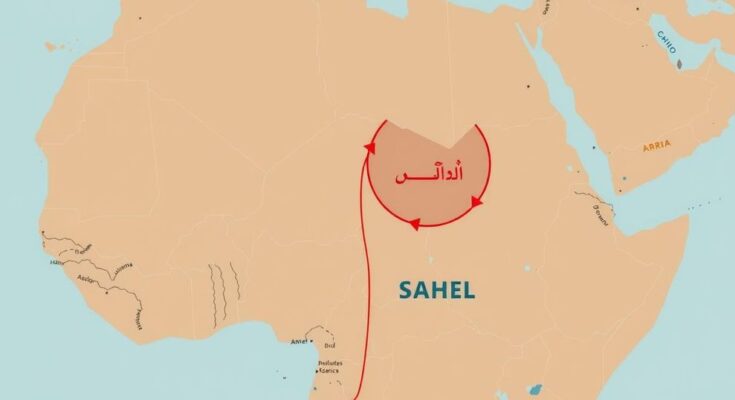Togo is exploring membership in the Alliance of Sahel States, consisting of Mali, Burkina Faso, and Niger, seeking to enhance regional cooperation and economic access. Foreign Minister Robert Dussey emphasized the strategic benefits of such membership, while analysts point to potential military collaboration amid rising jihadist threats. However, concerns arise about Togo’s departure from ECOWAS and the implications for both regional stability and governance.
Togo is seemingly seeking to join a new confederation with the junta-led nations of Mali, Burkina Faso, and Niger. This potential alliance may provide Togo crucial benefits by facilitating access to its port, which is particularly vital for these landlocked nations. Foreign Minister Robert Dussey has publicly indicated these intentions, emphasizing that membership could enhance regional collaboration.
In recent remarks, Minister Dussey asserted, “Togo is considering joining the AES, a strategic decision that could strengthen regional cooperation and offer access to the sea to member countries.” Such access is essential for Mali, Burkina Faso, and Niger as they continue to deal with insecurity and political challenges. Analysts suggest that Togo’s participation in the alliance could foster economic collaboration and improved military cooperation.
Political analyst Madi Djabakate highlighted the potential for “economic solidarity: access to Nigerien oil, renewed trade routes,” which may be advantageous for Togo. In light of increased jihadist activities in northern Togo, joining this confederation could also allow for better intelligence sharing among the countries. The AES has faced challenges in combatting these threats since its members initiated coups in recent years.
Togo seems aligned with the AES’s approach to regaining sovereignty. All member countries are distancing themselves from traditional allies like France, gravitating towards partnerships with Russia and other nations. Djabakate remarked that Togo’s engagement with the AES contributes to a pan-African narrative, suggesting a collective effort among nations in the region to unite.
Under President Faure Gnassingbe, who has held power since 2005, Togo’s political landscape is increasingly influenced by pan-Africanism, which is gaining traction among the populace. The AES members have shown reluctance to yield to pressure for immediate elections, extending transition periods instead.
Furthermore, Togo’s inclination towards the AES may serve as a distraction from its domestic political struggles. A constitution adopted last year has drawn criticism for potentially enabling Gnassingbe to maintain power indefinitely. Sociologist Francis Akindes pointed out the synchronized governance strategies shared between Togo and AES nations, emphasizing a lack of transition.
Opposition figure Nathaniel Olympio warned of the repercussions of Togo withdrawing from the Economic Community of West African States (ECOWAS). He noted that AES membership could exempt Togo from ECOWAS’s obligations concerning governance and civil liberties. This trend aligns with Mali, Niger, and Burkina Faso’s prior decision to leave ECOWAS, citing its alignment with French interests.
Seidik Abba, head of an independent center for Sahel studies, remarked on Togo’s longstanding relationships with these military regimes, noting its past role as a mediator with ECOWAS. Political analyst Djabakate believes that Togo could simultaneously engage with both ECOWAS and the AES. He emphasized, “Alliances aren’t marriages, but rather partnerships,” suggesting Togo could maintain ties with ECOWAS while seeking new opportunities.
Finally, Djabakate asserted that Togo aims to remain anchored in a historic institution while pursuing new alliances. However, should Togo formally align with the AES, Abba cautioned that this decision could exacerbate the current instability within ECOWAS, potentially accelerating its disintegration while placing Togo’s future at risk.
In summary, Togo’s consideration to join the Alliance of Sahel States suggests a strategic pivot toward greater regional cooperation with neighboring junta-led countries. This potential alliance could bolster Togo’s economic prospects and military collaborations, while simultaneously distancing itself from traditional relationships with Western powers. Nevertheless, the implications of this move on Togo’s position within ECOWAS highlight a complex balance between regional solidarity and domestic political dynamics that could ultimately reshape West African politics.
Original Source: thedefensepost.com


